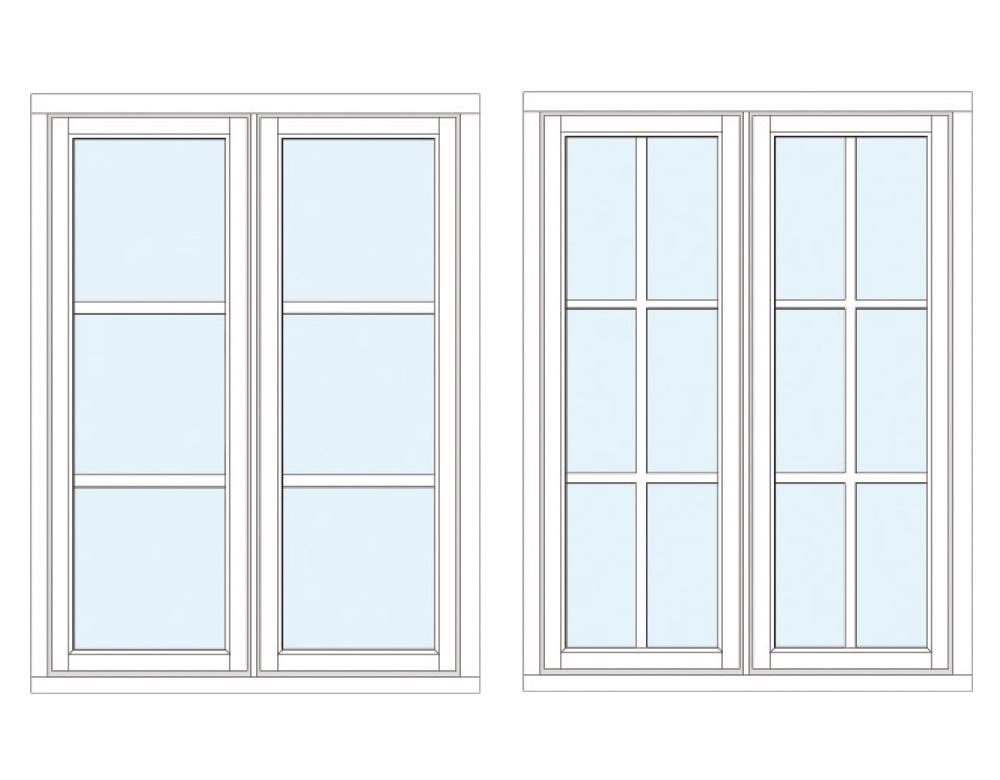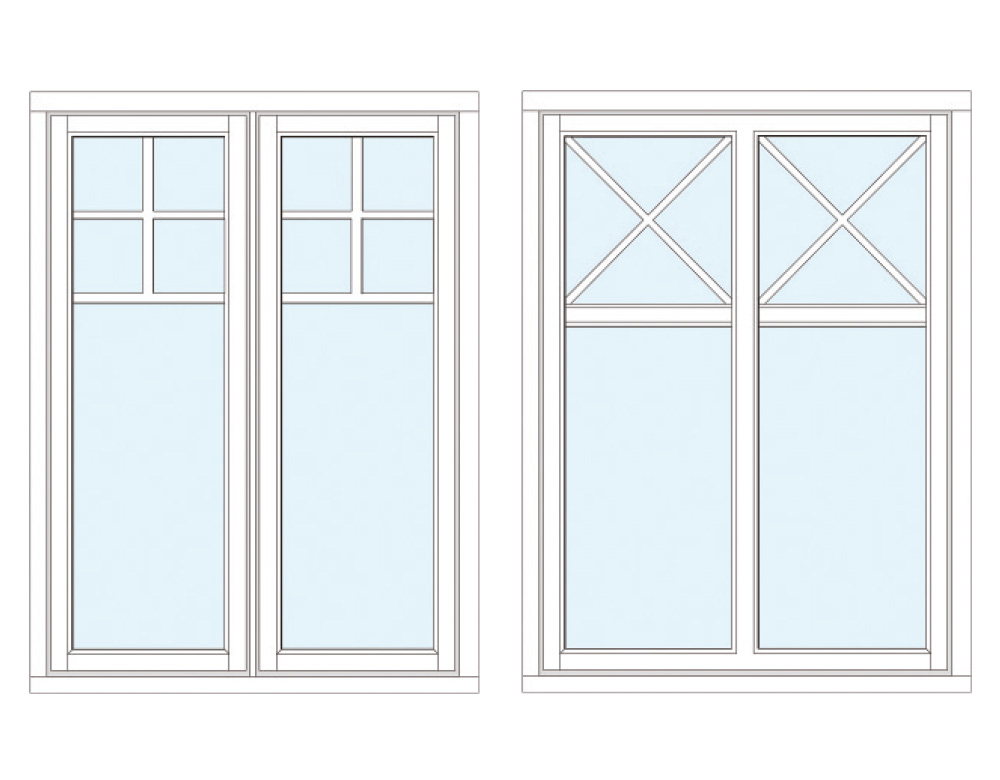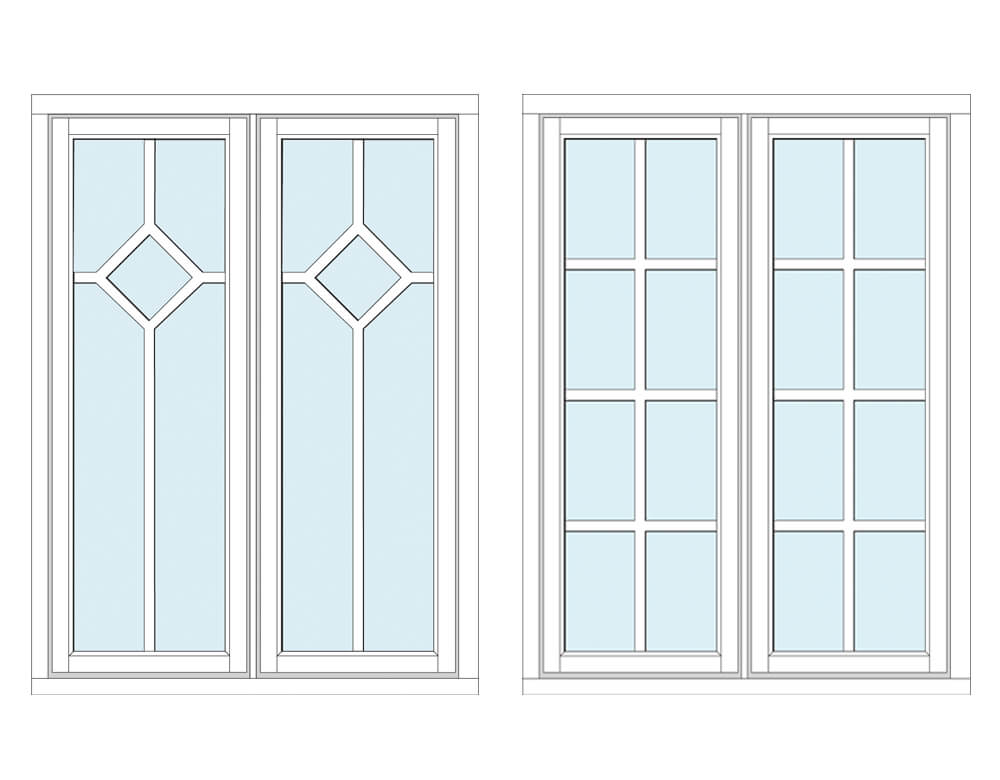
Genuine wooden astragals for windows
Windows with astragals are beautiful! Ekstrands offers several different exclusive astragal options if you want classic windows. The astragals are made of knot-free wood and are mounted on the window upon delivery.

Windows with with real wooden astragals
Astragals and the design of astragals change the character of a property. It is important that the size and number of bars on each window are adjusted so that it looks good. Ekstrands manufactures all types of astragals, horizontal, vertical and diagonal crosses. We have several different variants of astragals in the range to be able to adapt all window systems to each customer's specific wishes. If there is uncertainty about the design, we produce a drawing on the window with different bars.

Vienna astragals wood (WSP)
Vienna astragals is an exclusive real wooden astragal where the bar is glued on both sides of the glass with an aluminum profile between the glasses. Vienna astragals are also available for aluminum-clad windows, see WSPA. For 2-color painted windows, this is the best option. By default, the astragal is profiled on the inside and straight on the outside.

Vienna astragals for aluminium windows (WSPA)
Vienna astragals are also available for aluminum-clad windows. An exclusive genuine astragal that is glued on both sides of the glass with an aluminum profile between the windows. On the inside there is a wooden astragal and on the outside is an aluminum profile.

Astragals to take off in wood (SP)
SP is our standard surface-mounted astragal. It is a wooden astragal with genuine "carpenter's cross", this means that the astragal does not consist of loose sticks, but the cross of the bar has been tapped together in the traditional way. It is an astragal with smart locking fittings, which means that it is guaranteed to remain on the window. With a simple hand grip, you open the lock and can lift off the astragal when cleaning. SP is an astragal that is normally delivered mounted on the window upon delivery.

Astragals to take off in aluminum (SPA)
SPA is a surface-mounted aluminum astragal. This astragal is not made with loose sticks but is tapped together in the same way as our wooden bars, with a real "carpenter's cross". It is a stable construction of astragals that is easy to remove when cleaning the window. Normally delivered mounted on the window.

Astragals on a frame (RSP)
Astragals on a frame is an exclusive astragal that is mounted with small piano hinges on the window frame. With a small locking fitting, you open and unfold the entire astragal cassette, which makes cleaning the windows very easy. Best suited for our inwards opening window systems and is also recommended for curved windows.

Aluminium astragals (ASP)
Aluminum astragals between the glasses means that you can polish the glass on both sides without having to take into account the bars when they are between the glasses. Fits all types of windows but is not as visible when you see the windows from the side than straight from the front. Delivered as standard in 26mm width but available in several designs and colors.

Glass dividing post (GDP)
Our glass-dividing posts are genuine where the wood divides the glass. Can be delivered in 58mm or 78mm width. Delivered as standard with drip strip, this can be removed as desired.
EXAMPLE OF astragalS
When painting in two colours, we recommend Viennese bars as this allows the correct colour of the bars when viewed from the inside.


































HISTORY OF astragals
Barrier windows have their history in technical limitations, in the 18th century it was only possible to manufacture small panes of glass, these were put together with lead frames and thus large windows were obtained.
Over time, wooden bars replaced the earlier lead bars and the classic 2-light window was created. This window was the most popular during the 19th century and is still a classic style that is popular in, among others, Skåne.
At the end of the 19th century, technical advances were made and larger panes of glass could be manufactured. 4-light windows and so-called T-post windows began to be manufactured. During this period, window installations became more lavish with scope, decorations and more processed window profiles. (Source, among others, Helsingborg museums)
TRENDS
Around the millennium, the so-called neo-functional trend came, clean modern lines with large or long narrow windows, often with pulpit ceilings. Then the trend continued with modern houses and minimalist environments, cubist shapes, open floor plans, large glass openings, glass and concrete. This was then followed by a sharp contrast in the form of the New England style that had its peak in the mid-2010s.
The trend in recent years has been a slight backlash against the previously stripped-down and modern, mullions have returned. While warmer environments and natural materials are sought, modern and minimalist remain, we see a crossover where old meets new.
The new barns and industrial design in recent years are examples of architecture where old meets new. Barns with recessed roof overhangs, raw natural facades, minimalist interiors with open spaces and at the same time the environment has been given mullioned windows. Windows with mullions create a warm feeling and fit very well into this style.
A trend that we have noticed in recent years is increased awareness of the style and architecture of different periods, both in new construction but especially in renovation. Especially in the 80s and 90s, we have seen many bad examples of renovations of houses built between 1950 and 1980, with little or no consideration given to the era and the style of the house. An example of this is installing aluminum-clad windows on a house that had older beautiful wooden windows, or replacing an exterior door that does not fit the style of the era at all.
Many more people today seem to understand the importance of architecture and therefore renovate carefully, paying attention to details and the design of e.g. mullions, but also color and material selection. Many older houses require wooden windows in order to maintain the style and character of the house; an aluminum-clad window has a more modern and cooler appearance compared to a wooden window.
CONSTRUCTION AND USE
Ekstrands has worked for decades with what we call constructive wood protection. It is about constructing the product in such a way that it withstands the elements in the best possible way, much of this knowledge is old and accepted but is not always practiced today.
Some examples of this are that we use knot-free wood to avoid knot bleeding, knot bleeding risks damage to the paint film. We dip-prime the material with an impregnation that partly consists of linseed oil, we use a slow-drying and diffusion-open paint system. We drill and mill for mounting fittings before impregnation and painting, this may seem obvious but unfortunately it has not always been so.
We mount the glazing bead on the inside of the window and then fully glue the glass. We do not use saw cuts and thereby avoid capillary traps. Our bars have a genuine carpenter's cross and smart fittings on the outer edges that lock the bar to the frame, it is never possible to avoid some movement in this type of wooden construction, therefore it is important that the bar is firmly attached.